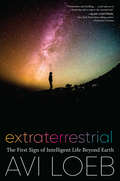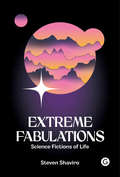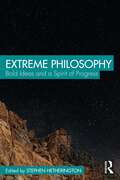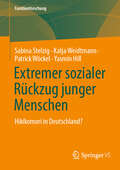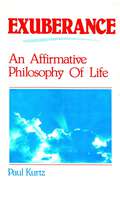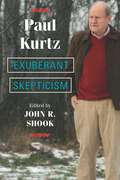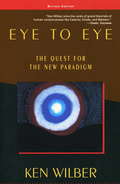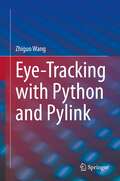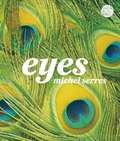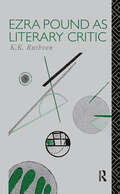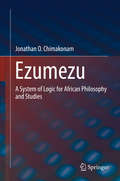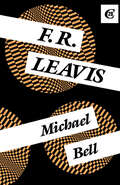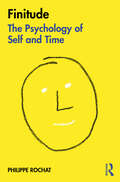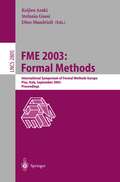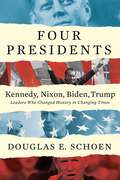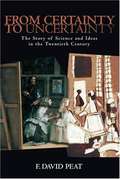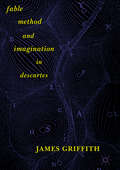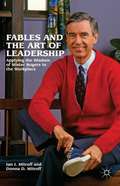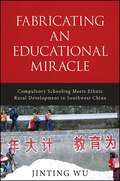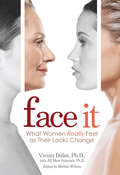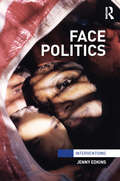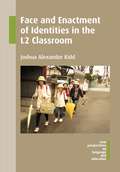- Table View
- List View
Extraterrestrial: The First Sign of Intelligent Life Beyond Earth
by Avi LoebHarvard’s top astronomer lays out his controversial theory that our solar system was recently visited by advanced alien technology from a distant star. In late 2017, scientists at a Hawaiian observatory glimpsed an object soaring through our inner solar system, moving so quickly that it could only have come from another star. Avi Loeb, Harvard’s top astronomer, showed it was not an asteroid; it was moving too fast along a strange orbit, and left no trail of gas or debris in its wake. There was only one conceivable explanation: the object was a piece of advanced technology created by a distant alien civilization. In Extraterrestrial, Loeb takes readers inside the thrilling story of the first interstellar visitor to be spotted in our solar system. He outlines his controversial theory and its profound implications: for science, for religion, and for the future of our species and our planet. A mind-bending journey through the furthest reaches of science, space-time, and the human imagination, Extraterrestrial challenges readers to aim for the stars—and to think critically about what’s out there, no matter how strange it seems. <P><P> <b>A New York Times Bestseller</b>
Extreme Fabulations: Science Fictions of Life
by Steven ShaviroAn examination of science fiction narratives and the light they shed on human life, the unknowable future, and the vagaries of unforeseeable change.With this book, Steven Shaviro offers a thought experiment. He discusses a number of science fiction narratives: three novels, one novella, three short stories, and one musical concept album. Shaviro not only analyzes these works in detail but also uses them to ask questions about human, and more generally, biological life: about its stubborn insistence and yet fragility; about the possibilities and perils of seeking to control it; about the aesthetic and social dimensions of human existence, in relation to the nonhuman; and about the ethical value of human life under conditions of extreme oppression and devastation. Shaviro pursues these questions through the medium of science fiction because this form of storytelling offers us a unique way of grappling with issues that deeply and unavoidably concern us but that are intractable to rational argumentation or to empirical verification. The future is unavoidably vague and multifarious; it stubbornly resists our efforts to know it in advance, let alone to guide it or circumscribe it. But science fiction takes up this very vagueness and indeterminacy and renders it into the form of a self-consciously fictional narrative. It gives us characters who experience, and respond to, the vagaries of unforeseeable change.
Extreme Philosophy: Bold Ideas and a Spirit of Progress
by Stephen HetheringtonPhilosophy’s value and power are greatly diminished when it operates within a too closely confined professional space. Extreme Philosophy: Bold Ideas and a Spirit of Progress serves as an antidote to the increasing narrowness of the field. It offers readers–including students and general readers–twenty internationally acclaimed philosophers who highlight and defend odd, extreme, or ‘mad’ ideas. The resulting conjectures are often provocative and bold, but always clear and accessible.Ideas discussed in the book, include: propaganda need not be irrational science need not be rational extremism need not be bad tax evasion need not be immoral anarchy need not be uninviting democracy need not remain as it generally is humans might have immaterial souls human minds might have all-but-unlimited powers knowing might be nothing beyond being correct space and time might not be ‘out there’ in reality value might be the foundational part of reality value might differ in an infinitely repeating reality reality is One reality is vague In brief, the volume pursues adventures in philosophy. This spirit of philosophical risk-taking and openness to new, ‘large’ ideas were vital to philosophy’s ancient origins, and they may also be fertile ground today for philosophical progress.
Extremer sozialer Rückzug junger Menschen: Hikikomori in Deutschland? (Familienforschung)
by Katja Weidtmann Sabina Stelzig Patrick Wöckel Yasmin HillDer Band bietet einen systematischen Überblick über das Phänomen extremer sozialer Rückzüge junger Menschen, das in Japan unter dem Begriff „Hikikomori&“ bekannt ist. Dieser Begriff bezeichnet die langfristige Selbstisolation junger Menschen vor der Gesellschaft, ohne dass vorrangig eine psychische Erkrankung vorliegt. Die Person im sozialen Rückzug wird zumeist - allerdings ohne einen direkten Kontakt - durch ihre Familie versorgt. Das Buchprojekt nähert sich dem Thema umfassend aus einer interdisziplinären Sicht. Dabei geraten nicht nur das Individuum selbst, sondern das gesamte Familiensystem sowie die es umgebenden kulturellen und gesellschaftliche Bedingungen in den Blick. Vor dem Hintergrund einiger Fallbeispiele wird diskutiert, ob der Rückzug von jungen Menschen aus der Gesellschaft auch in Deutschland sinnvoll mit dem Phänomen „Hikikomori&“ beschrieben werden kann. Denn während in Japan seit den 1990 Jahren auch auf staatlicher Ebene vielfältige unterstützende Präventions- und Interventionsformen entwickelt wurden, fallen in Deutschland junge Menschen im extremen sozialen Rückzug und ihre Angehörigen bislang durch fast alle Raster.
Extremism: A Philosophical Analysis
by Quassim CassamExtremism is one of the most charged and controversial issues of the twenty-first century. Despite myriad programs of deradicalization and prevention around the world, it remains an intractable and poorly understood problem. Yet it is also sometimes regarded as a positive force – according to Martin Luther King Jr., 'the question is not whether we will be extremists, but what kind of extremists we will be'. In this much-needed and lucid book, Quassim Cassam identifies three types of extremism – ideological; methods; and psychological extremism – and discusses the following fundamental topics and issues: What is extremism? What are the methods adopted by extremists? Is there an extremist ‘mindset’ and if so, what is it? What role do ideas of purity, victimhood and humiliation play in understanding extremism? How does extremism differ from fanaticism and fundamentalism? How does one become an extremist and how should we understand deradicalization? Throughout the book, Quassim Cassam uses many compelling examples, ranging from the Khmer Rouge, the IRA, Al-Qaeda and Timothy McVeigh to Philip Roth’s novel American Pastoral and counter-extremism programmes, including the UK’s Prevent strategy. Clear-headed and engaging, Extremism: A Philosophical Analysis is essential reading for anyone interested in this important topic, not only in Philosophy but related disciplines such as Politics and International Relations, Conflict and Terrorism Studies, Law, Education and Religion. It will also be of great interest to policy-makers and those engaged in understanding extremism at any level.
Exuberance: An Affirmative Philosophy of Life
by Paul KurtzHappiness is within everyone's grasp and is only a matter of making the right choices. Taking destiny into one's own hands and having the creative audacity to strive, seek, and meet challenges is the essence of life's drama and exaltation. Life per se has no meaning; it only presents opportunity to be seized and acted upon, thus paving the way for personal achievement and the full life. Paul Kurtz, in Exuberance, shows his readers how to banish drudgery from life and how to find happiness in the active life. Drawing upon his personal experience, knowledge, and success, Kurtz explains his philosophy of life, discussing learning and work, pleasure, eroticism and sexuality, morality, the need for love and friendship, and participation in contemporary issues. He suggests that self-power, resourcefulness, daring, creativity, and intelligence help guide and control one's life in spite of the many obstacles along the way. Only the individual can initiate his own success and therefore can take pride in accomplishing what he sets out to do. Exuberance also shows the reader how to cope with an ambiguous world. Life is charged with unexpected events and bizarre happenings. It is filled with richly diverse and idiosyncratic characters. Constant effort and exertion is needed in making a living, meeting new friends, falling in love, raising children, seeing projects through, and coming to terms with old age and death. Dealing with these problems directly rather than fleeing from life's risks reinforces a person and leads him towards an exuberant, rich, zestful life. According to Dr. Kurtz, the fulfillment of one's own purpose is in creating one's own ends and expending the power and energy to attain them. Thus, life's great sin, he suggests, is being lazy and noncreative.
Exuberant Skepticism
by Paul KurtzFor more than three decades, philosopher Paul Kurtz has been a strong advocate of skepticism, not only as a philosophical position, but also as a fulfilling way of life. Contrary to the view that skepticism is merely a negative, nay saying, or debunking stance toward commonly held beliefs, skepticism as defined by Kurtz emerges reborn as "skeptical inquiry"-a decidedly positive philosophy ready and able to change the world. In this definitive collection, editor John R. Shook has gathered together seventeen of Paul Kurtz's most penetrating and insightful writings. Altogether these essays build an affirmative case for what can be known based on sound common sense, reason, and scientific method. And as each essay cogently and convincingly explains, so much can be known, from the natural world around us to the moral responsibilities among us. The work is organized in four topical sections. In the first, "Reasons to Be Skeptical," Kurtz presents compelling reasons why the methods of inquiry used by the sciences deserve respect. In short, science provides reliable knowledge, without which humanity would never have emerged from the age of myth and widespread ignorance. In the second section, "Skepticism and the Non-Natural," Kurtz shows how skeptical inquiry can be fruitfully used to critique both paranormal claims and religious worldviews. He also investigates whether science and religion can be compatible. In the third section, "Skepticism in the Human World," he considers how skeptical inquiry can be applied to politics, ethics, and pursuit of the good life. Realizing the essential connections between scientific knowledge, technological power, and social progress, Kurtz has understood, as few philosophers ever have, how the methods of intelligence can be applied to all areas of human endeavor. The book concludes with Kurtz's authoritative reflections on the skeptical movement that he founded and has led. As he explains, the forces of blind faith and stubborn unreason still fight for control of the mind, so the skeptic can never rest. If there is a brighter future for humanity, a future in which every person enjoys a realistic opportunity for the pursuit of excellence, Kurtz's 'exuberant skepticism' can show us the way.
Eye to Eye: The Quest for the New Paradigm
by Ken WilberIn this book Wilber presents a model of consciousness that encompasses empirical, psychological, and spiritual modes of understanding. Wilber examines three realms of knowledge: the empirical realm of the senses, the rational realm of the mind, and the contemplative realm of the spirit. Eye to Eye points the way to a broader, more inclusive understanding of ourselves and the universe.
Eye-Tracking with Python and Pylink
by Zhiguo WangSeveral Python programming books feature tools designed for experimental psychologists. What sets this book apart is its focus on eye-tracking.Eye-tracking is a widely used research technique in psychology and neuroscience labs. Research grade eye-trackers are typically faster, more accurate, and of course, more expensive than the ones seen in consumer goods or usability labs. Not surprisingly, a successful eye-tracking study usually requires sophisticated computer programming. Easy syntax and flexibility make Python a perfect choice for this task, especially for psychology researchers with little or no computer programming experience.This book offers detailed coverage of the Pylink library, a Python interface for the gold standard EyeLink ® eye-trackers, with many step-by-step example scripts. This book is a useful reference for eye-tracking researchers, but you can also use it as a textbook for graduate-level programming courses.
Eyes
by Michel Serres Anne-Marie Feenberg-Dibon'Eyes' is a masterful enactment of ways of seeing, thinking and knowing. This book addresses us to a world with a painterly eye, where the painting emits, transmits and emanates its own radiance. It poses the questions, what is it to see and to be seen: what if the world sees? How do we imagine eyes other than human eyes: what can insects, animals and seemingly inanimate objects see? How does this reconfiguration of seeing change our perception of the natural world and the human species?
Eyewitness to Power: The Essence of Leadership Nixon to Clinton
by David GergenFrom Nixon to Clinton, Watergate to Whitewater, few Americans have observed the ups and downs of presidential leadership more closely over the past thirty years than David Gergen. A White House adviser to four presidents, both Republican and Democrat, he offers a vivid, behind-the-scenes account of their struggles to exer- cise power and draws from them key lessons for leaders of the future. Gergen begins Eyewitness to Power with his reminiscence of being the thirty-year-old chief of the White House speechwriting team under Richard Nixon, a young man at the center of the Watergate storm. He analyzes what made Nixon strong-and then brought him crashing down: Why Nixon was the best global strategist among recent presidents. How others may gain his strategic sense. How Nixon allowed his presidency to spin out of control. Why the demons within destroyed him. What lessons there are in Nixon's disaster. Gergen recounts how President Ford recruited him to help shore up his White House as special counsel. Here Gergen considers: Why Ford is one of our most underrated presidents. Why his pardon of Nixon was right on the merits but was so mishandled that it cost him his presidency. Even in his brief tenure, Ford offers lessons of leadership for others, as Gergen explains. Though Gergen had worked in two campaigns against him, Ronald Reagan called him back to the White House again, where he served as the Gipper's first director of communications. Here he describes: How Reagan succeeded where others have failed. Why his temperament was more important than his intelligence. How he mastered relations with Congress and the press. The secrets of "the Great Communicator" and why his speeches were the most effective since those of John Kennedy and Franklin Roosevelt.
Ezra Pound as Literary Critic (Critics of the Twentieth Century)
by Emeritus Professor Ruthven K. K. RuthvenBringing some of the insights of modern critical theory to bear on a great deal of information about Pound's activities as a literary critic (some of it made available only recently), K.K. Ruthven provides a provocative re-reading of a major modernist writer who dominated the discourse of modernism.
Ezumezu: A System of Logic for African Philosophy and Studies
by Jonathan O. ChimakonamThe issue of a logic foundation for African thought connects well with the question of method. Do we need new methods for African philosophy and studies? Or, are the methods of Western thought adequate for African intellectual space? These questions are not some of the easiest to answer because they lead straight to the question of whether or not a logic tradition from African intellectual space is possible. Thus in charting the course of future direction in African philosophy and studies, one must be confronted with this question of logic. The author boldly takes up this challenge and becomes the first to do so in a book by introducing new concepts and formulating a new African culture-inspired system of logic called Ezumezu which he believes would ground new methods in African philosophy and studies. He develops this system to rescue African philosophy and, by extension, sundry fields in African Indigenous Knowledge Systems from the spell of Plato and the hegemony of Aristotle. African philosophers can now ground their discourses in Ezumezu logic which will distinguish their philosophy as a tradition in its own right. On the whole, the book engages with some of the lingering controversies in the idea of (an) African logic before unveiling Ezumezu as a philosophy of logic, methodology and formal system. The book also provides fresh arguments and insights on the themes of decolonisation and Africanisation for the intellectual transformation of scholarship in Africa. It will appeal to philosophers and logicians—undergraduates and post graduate researchers—as well as those in various areas of African studies.
F.R. Leavis (Critics of the Twentieth Century)
by Michael BellFirst published in 1988. Routledge is an imprint of Taylor & Francis, an informa company.
FINITUDE: The Psychology of Self and Time
by Philippe RochatPhilippe Rochat’s FINITUDE is a rumination on time and self-consciousness. It is built around the premise that finitude and separation form the human self-conscious reality of time. It argues that we need to reclaim time from current theories in physics that tend to debunk time as an illusion, or state that time simply does not exist. This thought-provoking book considers how, from a human psychological and existential standpoint, time is very real. It examines how we make sense of such reality in human development and in comparison to other living creatures. The book explores how we represent time and live with it. It tries to capture the essence of time in our self-conscious mind. If we opt to live for as long as possible and knowing that it is going to end, how should we exist? FINITUDE contemplates this most serious psychological question. It considers the developmental origins of human subjectivity, the foundations of our sense of being alive and the explicit awareness of existing in finite time. It deals with how we live and represent our finite time, how we construe and archive in memory the events of our life, how we project ourselves into the future, and how we are all constrained to knowingly exist in finite time Offering an overarching understanding of concepts, above and beyond the methodological details, this book will be an essential reading for all advanced students and researchers interested in the psychology of time, and the development of self.
FME 2003: Formal Methods
by Dion Mandrioli Stefania Gnesi Keijiro ArakiThis book constitutes the refereed proceedings of the International Symposium of Formal Methods Europe, FME 2003, held in Pisa, Italy in September 2003. The 44 revised full papers presented together with 5 invited papers were carefully reviewed and selected from 144 submissions. The papers are organized in topical sections on industrial issues, control systems and applications, communication system verfication, co-specification and compilers, composition, Java, object-orientation and modularity, model checking, parallel processes, program checking and testing, B method, and security.
FME 2003: International Symposium of Formal Methods Europe. Pisa Italy, September 8-14, 2003, Proceedings (Lecture Notes in Computer Science #2805)
by Stefania Gnesi Keijiro Araki Dino MandrioliThisvolumecontainstheproceedingsofFM2003,the12thInternationalFormal Methods Europe Symposium which was held in Pisa, Italy on September 8–14, 2003. Formal Methods Europe (FME, www. fmeurope. org) is an independent - sociation which aims to stimulate the use of and research on formal methods for system development. FME conferences began with a VDM Europe symposium in 1987. Since then, the meetings have grown and have been held about once - ery 18 months. Throughout the years the symposia have been notably successful in bringing together researchers, tool developers, vendors, and users, both from academia and from industry. Unlike previous symposia in the series, FM 2003 was not given a speci?c theme. Rather, its main goal could be synthesized as “widening the scope. ” Indeed, the organizers aimed at enlarging the audience and impact of the symposium along several directions. Dropping the su?x ‘E’ from the title of the conference re?ects the wish to welcome participation and contribution from every country; also,contributionsfromoutsidethetraditionalFormalMethodscommunitywere solicited. The recent innovation of including an Industrial Day as an important part of the symposium shows the strong commitment to involve industrial p- ple more and more within the Formal Methods community. Even the traditional and rather fuzzy borderline between “software engineering formal methods” and methods and formalisms exploited in di?erent ?elds of engineering was so- what challenged.
FOUR PRESIDENTS Kennedy, Nixon, Biden, Trump: Leaders Who Changed History in Changing Times
by Douglas E SchoenA Simon & Schuster eBook. Simon & Schuster has a great book for every reader.
FROM CERTAINTY TO UNCERTAINTY: The Story of Science and Ideas in the Twentieth Century
by F. David PeatEarly theorists believed that in science lay the promise of certainty. Built on a foundation of fact and constructed with objective and trustworthy tools, science produced knowledge. But science has also shown us that this knowledge will always be fundamentally incomplete and that a true understanding of the world is ultimately beyond our grasp. In this thoughtful and compelling book, physicist F. David Peat examines the basic philosophic difference between the certainty that characterized the thinking of humankind through the nineteenth century and contrasts it with the startling fall of certainty in the twentieth. The nineteenth century was marked by a boundless optimism and confidence in the power of progress and technology. Science and philosophy were on firm ground. Newtonian physics showed that the universe was a gigantic clockwork mechanism that functioned according to rigid laws—that its course could be predicted with total confidence far into the future. Indeed, in 1900, the President of the Royal Society in Britain went so far as to proclaim that everything of importance had already been discovered by science. But it was not long before the seeds of a scientific revolution began to take root. Quantum Theory and the General Theory of Relativity exploded the clockwork universe, proving beyond a shadow of a doubt that our knowledge was, at best, incomplete—and would probably remain that way forever. There were places in the universe, such as black holes, from which no information at all could ever be obtained. Chaos Theory also demonstrated our inherent limits to knowing, predicting, and controlling the world around us and showed the way that chaos can often be found at the heart of natural and social systems. Although we may not always recognize it, this new world view has had a profound effect not only on science, but on art, literature, philosophy, and societal relations. The twenty-first century now begins with a humble acceptance of uncertainty. From Certainty to Uncertainty traces the rise and fall of the deterministic universe and shows the evolving influences that such disparate disciplines now have on one another. Drawing on the lessons we can learn from history, Peat also speculates on how we will manage our lives into the future.
Fable, Method, and Imagination in Descartes
by James GriffithWhat role do fables play in Cartesian method and psychology? By looking at Descartes' use of fables, James Griffith suggests there is a fabular logic that runs to the heart of Descartes' philosophy. First focusing on The World and the Discourse on Method, this volume shows that by writing in fable form, Descartes allowed his readers to break from Scholastic methods of philosophizing. With this fable-structure or -logic in mind, the book reexamines the relationship between analysis, synthesis, and inexact sciences; between metaphysics and ethico-political life; and between the imagination, the will, and the passions.
Fables and the Art of Leadership
by Ian I. Mitroff Donna D. MitroffFred Rogers is one of the great icons of American culture and the values and philosophy for which he is famous have stood the test of time. Fables and the Art of Leadership brings those same values and philosophy to the workplace, where they're now needed more than ever. This unique and timely work is for everyone who aspires to become and be a better leader. Mister Rogers didn't expound abstract principles to help children face up to the problems they faced; instead, he created and told countless fables and stories. Ian and Donna Mitroff's book uses those fables to help managers master the most difficult challenges they face: achieving significant change; fostering creativity; curbing rudeness; promoting leadership, managing crises, and many more. It is their new interpretations for the workplace that will make Fables and the Art of Leadership a classic in business studies.
Fabricating an Educational Miracle: Compulsory Schooling Meets Ethnic Rural Development in Southwest China
by Jinting WuWinner of the 2017 American Educational Research Association's Division B Outstanding Book Recognition AwardWinner of the 2017 Society of Professors of Education Outstanding Book AwardIn today's China, education is translated into both acute social desires and profound disenchantment. Shanghai's stellar performance in the recent Program for International Student Assessment paints a celebratory image of educational success yet tells only a partial story. For many in rural China who are schooled yet prepared only for factory sweatshops, education remains an elusive ideal and offers a hollowed promise of social mobility. Fabricating an Educational Miracle laces together complex accounts of how compulsory education produces dilemmas and possibilities in village schools in Southwest China. Drawing from interviews, participant observations, oral history, and archival research in a Miao and a Dong village-town in Qiandongnan Prefecture, Guizhou Province, this book examines the manifold and contradictory agendas that have captured rural ethnic schooling at a crossroads.
Face It: What Women Really Feel As Their Looks Change
by Vivian DillerLet’s face it: everyone’s getting older. But millions of women, raised to believe that success and happiness are based on their intelligence and accomplishments, face an unexpected challenge: the physical realities of aging. If looks are not supposed to matter, why do so many women panic as their appearance changes? Their dilemma stems from two opposing societal views of beauty which lead to two different approaches to aging. Should women simply grow old naturally since their looks don’t define them, or should they fight the signs of aging since beauty and youth are their currency and power? This Beauty Paradox leaves many women feeling stuck. Face It, by Vivian Diller, Ph.D., is a psychological guide to help women deal with the emotions brought on by their changing appearances. As a model turned psychotherapist, Diller has had the opportunity to examine the world of beauty from two very different vantage points. This unique perspective helped her develop a six-step program that begins with recognizing "uh-oh" moments that reveal the reality of changing looks, and goes on to identify the masks used to cover deeper issues and define the role beauty plays in a woman’s life, and ends with bidding adieu to old definitions of beauty, so women can enjoy their appearance—at any age!
Face Politics (Interventions)
by Jenny EdkinsThe face is central to contemporary politics. In Deleuze and Guattari’s work on faciality we find an assertion that the face is a particular politics, and dismantling the face is also a politics. This book explores the politics of such diverse issues as images and faces in photographs and portraits; expressive faces; psychology and neuroscience; face recognition; face blindness; facial injury, disfigurement and face transplants through questions such as: What it might mean to dismantle the face, and what politics this might entail, in practical terms? What sort of a politics is it? Is it already taking place? Is it a politics that is to be desired, a better politics, a progressive politics? The book opens up a vast field of further research that needs to be taken forward to begin to address the politics of the face more fully, and to elaborate the alternative forms of personhood and politics that dismantling the face opens to view. The book will be agenda-setting for scholars located in the field of international politics in particular but cognate areas as well who want to pursue the implications of face politics for the crucial questions of subjectivity, sovereignty and personhood.
Face and Enactment of Identities in the L2 Classroom
by Joshua Alexander KiddThis book examines student identities as revealed through the pragmatics of face as observed in the context of English L2 classroom interaction between Japanese students and a native speaker teacher. Classroom recordings together with retrospective interviews reveal specific points during learning activities when the students and their teacher s interpretations of classroom communication deviate from what was intended. This research study is a potent reminder that what students and teachers may consider as standard and conventionally acceptable language use and behaviour within the classroom context can differ dramatically according to social, cultural and individual frames of reference. The book outlines an innovative teacher professional development program which encourages teachers to reflect on and, where desired, modify or discontinue existing pedagogic practices. "
